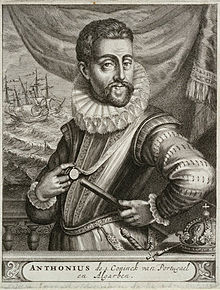Anthony, Prior of Crato
| António | |
|---|---|

Anthonius Coninck van Portugal en Algarve showing the medal of the Order of Aviz in a Flemish engraving of 1595
|
|
|
King of Portugal and the Algarves (disputed) |
|
| Reign | 24 July 1580 – 25 August 1580 |
| Acclamation | 24 July 1580, Santarém |
| Predecessor | Henry |
| Successor | Philip I |
| Born | 1531 Lisbon, Portugal |
| Died | 26 August 1595 (aged 63–64) Paris, France |
| Partner | Ana Barbosa |
| Issue |
|
| House | Aviz |
| Father | Louis, Duke of Beja |
| Mother | Violante Gomes |
| Religion | Roman Catholicism |
António, Prior of Crato (Portuguese pronunciation: [ɐ̃ˈtɔniu]; 1531 – 26 August 1595; sometimes called The Determined, The Fighter or The Independentist), was a grandson of King Manuel I of Portugal and claimant of the Portuguese throne during the 1580 dynastic crisis. According to some historians, he was King of Portugal as António I of Portugal for 33 days in 1580. After the crowning of Philip II of Spain as King of Portugal, António claimed the throne until 1583. He was a disciple of Bartholomew of Braga.
António was born in Lisbon, the illegitimate son of Prince Louis, Duke of Beja (1506–1555) and Violante Gomes (some sources argue that his parents were later married, perhaps at Évora). His mother may have been of Sephardic Jewish extraction, as many Portuguese sources maintain, or possibly of "new Christian" (a forced convert of Jewish or Muslim origin) extraction. At least one source says she was a member of the minor Portuguese nobility, the daughter of Pedro Gomes from Évora. She died a nun at Santarém on 16 July 1568.
António was educated in Coimbra, and he was placed in the Order of St. John. He received the wealthy priory of Crato as a benefice. In 1571, he was named governor of the Portuguese fortification at Tangiers in Morocco.
...
Wikipedia
